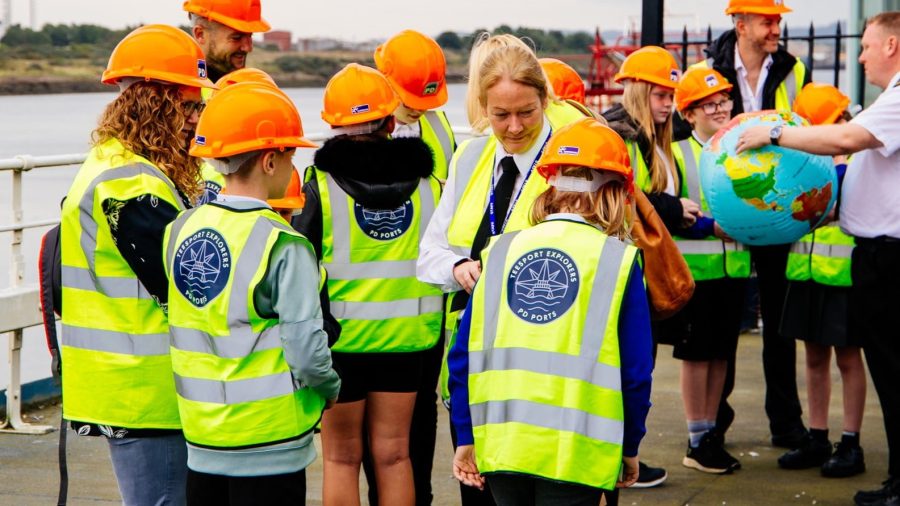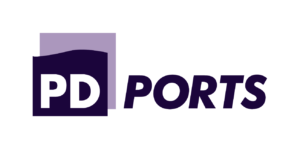
As it’s National Careers week and with International Women’s Day taking place this Friday 8th March we’ll be sharing the stories of some of our female employees to hear about their career journeys and why the PD Ports Women’s Network Group is important to them.
Assistant Harbour Master, Wendy O’Donnell, has worked for PD Ports for 12 years, but has spent her entire career in the maritime industry. She shares her story here, including her passion for a career at sea, some of the challenges she faced and how she hopes inclusion will inspire the next generation of seafarers.
How did you get started in the port industry?
My Granddad was in the Merchant Navy, and he used to talk about it a little bit when I was younger. I was 15 when I decided I wanted to go to sea too, and I was involved with the local Sea Cadets which took me on visits to the Harbour Office, the steelworks and visits onboard Royal Navy ships when alongside in the Tees. It all really inspired me, and I was determined to get into the industry, but I couldn’t see a clear way to achieve it. After a week trip locally onboard T.S.Royalist my heart was set and even the rough seas and cold winds off Hartlepool in November hadn’t deterred me!
I attended college locally and was encouraged to go to university but started then to shape my degree as much as possible towards the industry, and I would spend my holiday time sailing onboard T.S. Royalist as a deck hand in the summer and refitting in the dockyards during the winter This eventually led to me becoming the first female Sailing Master later on. I was 23 when I finally got to go to sea full-time in 2000, on a cadetship scheme.
I was then in the Merchant Navy for 12 years as a Deck Officer sailing on various vessels such as containerships, tankers, and cruise liners and I got to see plenty of places around the world. My last 3 years was the most adventurous when I joined British Antarctica Survey.
When I felt it was time to plan a career back on land, I knew I also wanted to return to Teesside as I had been based out of Hampshire for many years. From my experience when I was younger and from word of mouth, I targeted PD Ports as a place to work and kept an eye out for opportunities. I was delighted when the role of Assistant Harbour Master came up, making me the second woman to work in the Harbour Master’s Office as an Assistant Harbour Master – and I certainly won’t be the last.
What’s your favourite thing about working in your current role as Assistant Harbour Master?
I like the problem-solving and fast-paced nature of the job to help ships dock and working with customers. It’s always changing, no day is the same when you are dealing with shipping.
I’m also very fortunate that my role has a working pattern (job share) that can accommodate my work life balance as a sole parent. Childcare can be challenging for those doing shift work but the job share allows me to stay in a role I love and continue to be passionate about!
Have you experienced any obstacles in your career that are related to being a woman in a traditionally more male-populated industry?
Early on in my career, one of the companies I applied to said to me they wouldn’t sponsor me as an apprentice, as I might get pregnant and leave, wasting their time and money. Back then it was also the rule on many ships that females must be recruited in pairs, so they were not alone on a ship. I’m pleased a lot has changed in the last 20 years.
What do you think the Women’s Network Group can help with?
I just think there’s always room for making the world a better place, for everyone. Having a place where people who share a passion or who have experienced similar issues is very important. When I first began working here, I raised with one of my leaders at the time during a meeting about contractual issues, that the maternity leave policy here was not comparing favourably to what was on offer at other local organisations or even places like fast-food restaurants.
I didn’t receive any support for tackling this from my direct colleagues and so I decided to pursue it myself with HR with support from my seniors. As it turns out, there were other people also raising this a result, so I was able to add my voice to the review, and the policy was improved for both maternity and paternity leave, which is as I think it should be – it isn’t just about improving things for one gender over another – it’s about fairness for everyone.
It sometimes only takes one voice to initiate a change, but the power of a group means it can be amplified and action taken much more swiftly and smoothly, and without you having to a feel alone or that you’re the only one who cares. Sometimes it is harder to raise an issue that only affects women in front of a room of male colleagues and you don’t want to be treated differently – just fairly.
There are still issues to get sorted, it can still be a challenge to get the right PPE – we share experience to help solve things.
What have you achieved as part of the PD Ports Women’s Network Group so far?
I volunteered to be part of a group looking at improving the use of gender-neutral language so we are more inclusive, particularly in our policy and guidance. It can be very disengaging to hear only male terms used, as well as being factually incorrect. I’m reviewing the Harbour Office Policies to make sure language is gender neutral. We’ve also done the same checks in Conservancy and Tees Dock and will continue to do more.
I think there’s a place for language and meaning to evolve, and a place for history – there is so much rich history in maritime that should be protected. It’s about the right balance – for example, the term ‘seamanship’ is fine to me, I think it’s a word that reflects the history and transition of a craft, referring to ‘humans’ – but when we refer to a Captain as the ‘old man’ it doesn’t work for a woman. Harbour Master – this doesn’t seem ‘male’ reference to me – it’s referring to a skill, not a gender. My Captain’s Licence certificate refers to a ‘Master Mariners’, which I’m very proud of.
Do you have any female role models that have inspired you?
My mum. She always encouraged me to do whatever I wanted, without limitations. I’m not sure she has enjoyed the reality of what this turned into though – life at sea can have its challenges! My mum always tried to encourage me and my brothers to play with whatever toys we wanted, including dolls for the boys. She would really have a go at me if she heard me talking about limitations for myself because I was woman – I was once joking that I couldn’t fix my car because I’m only a girl, she and was not happy with me!
There was also a particularly inspirational colleague, Inger Olsen who I worked with at Carnival UK. She gave me lots of support and talked very honestly to me about the challenges of starting a family and the pros and cons of a sea versus shore-based life, and the sacrifices you are likely to have to make if you continue go away to sea again this is changing in the industry as women are returning to sea now after children.
Why do you think it’s important to raise awareness of inclusion within careers in maritime?
I think about this from my daughter’s point of view. I’m conscious of the language she hears, like fireman or policeman – I don’t want her to hear limits about her role in life. Nothing will change until we change it.
I’m also conscious that so few of those achieving a Captain’s licence (Master Mariner) are female – only 3% of all Captain’s licences granted by the UK government are to women. I’m seeing the Harbour Masters and Vessel Traffic Service (VTS) starting to be more mixed, and it helps that you can come in at different levels and progress through. I’m proud that a former colleague once gave me credit for kicking down a few doors for women to progress in our former company, and she then went on to be a Captain within.
I stay involved in working with the next generation, I work with the Sea Cadets on Teesside, and I teach short courses at a marine college. I remember it was my visit to the port at a young age that inspired me, as well the insight from Sea Cadets, so I like to try and share experiences with young people now. Even if they go on to follow careers outside the area – they might always come back, just like I did.
Stay tuned for more National Careers Week and International Women’s Day content, visit our social media to see how we’ve celebrated the week so far.
